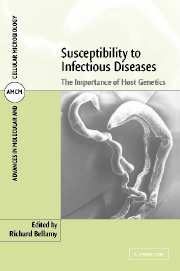Book contents
- Frontmatter
- Contents
- Contributors
- 1 Introduction
- 2 Application of genetic epidemiology to dissecting host susceptibility/resistance to infection illustrated with the study of common mycobacterial infections
- 3 The diverse genetic basis of immunodeficiencies
- 4 Genetic diversity in the major histocompatibility complex and the immune response to infectious diseases
- 5 The cystic fibrosis transmembrane conductance regulator
- 6 The influence of inherited traits on malaria infection
- 7 Polymorphic chemokine receptor and ligand genes in HIV infection
- 8 NRAMP 1 and resistance to intracellular pathogens
- 9 The interleukin-12/interferon-γ loop is required for protective immunity to experimental and natural infections by Mycobacterium
- 10 Mannose-binding lectin deficiency and susceptibility to infectious disease
- 11 Blood group phenotypes and infectious diseases
- 12 Genetics of human susceptibility to infection and hepatic disease caused by schistosomes
- 13 Genetic susceptibility to prion diseases
- Index
- Plate section
11 - Blood group phenotypes and infectious diseases
Published online by Cambridge University Press: 14 August 2009
- Frontmatter
- Contents
- Contributors
- 1 Introduction
- 2 Application of genetic epidemiology to dissecting host susceptibility/resistance to infection illustrated with the study of common mycobacterial infections
- 3 The diverse genetic basis of immunodeficiencies
- 4 Genetic diversity in the major histocompatibility complex and the immune response to infectious diseases
- 5 The cystic fibrosis transmembrane conductance regulator
- 6 The influence of inherited traits on malaria infection
- 7 Polymorphic chemokine receptor and ligand genes in HIV infection
- 8 NRAMP 1 and resistance to intracellular pathogens
- 9 The interleukin-12/interferon-γ loop is required for protective immunity to experimental and natural infections by Mycobacterium
- 10 Mannose-binding lectin deficiency and susceptibility to infectious disease
- 11 Blood group phenotypes and infectious diseases
- 12 Genetics of human susceptibility to infection and hepatic disease caused by schistosomes
- 13 Genetic susceptibility to prion diseases
- Index
- Plate section
Summary
INTRODUCTION
The first observations on associations between blood groups and infectious diseases were made in the 1950s, but the underlying mechanisms were not elucidated for many years. This could have been due to limited explanations for the epidemiological findings or to conflicting reports of associations between different blood groups with the same disease. An example of the latter is the large numbers of papers on Helicobacter pylori and ABO or Lewis blood groups/secretor status during the past few years which have reported inconsistent or conflicting results. Because determination of blood groups is a relatively simple and inexpensive procedure, many investigators have used it for quick “simple” studies without consideration of possible confounding factors. For all studies on blood groups and infection, the following points (gained with the experience of hindsight) need to be considered in planning or assessment of surveys:
The disease or organism under investigation needs to be clearly defined. Severity of the symptoms should be also be considered, e.g., differentiation of cases of Escherichia coli O157 infection between patients with uncomplicated diarrhoeal disease and those that develop haemolytic uraemic syndrome (HUS) (Blackwell et al., 2002).
It should be made clear that the investigation examined an outbreak or defined epidemic due to a particular strain in contrast to sporadic cases which could be due to strains with different antigenic characteristics or virulence factors.
Different populations express different quantities of antigens such as H, Lewisa, or Lewisb.
[…]
- Type
- Chapter
- Information
- Susceptibility to Infectious DiseasesThe Importance of Host Genetics, pp. 309 - 336Publisher: Cambridge University PressPrint publication year: 2003



